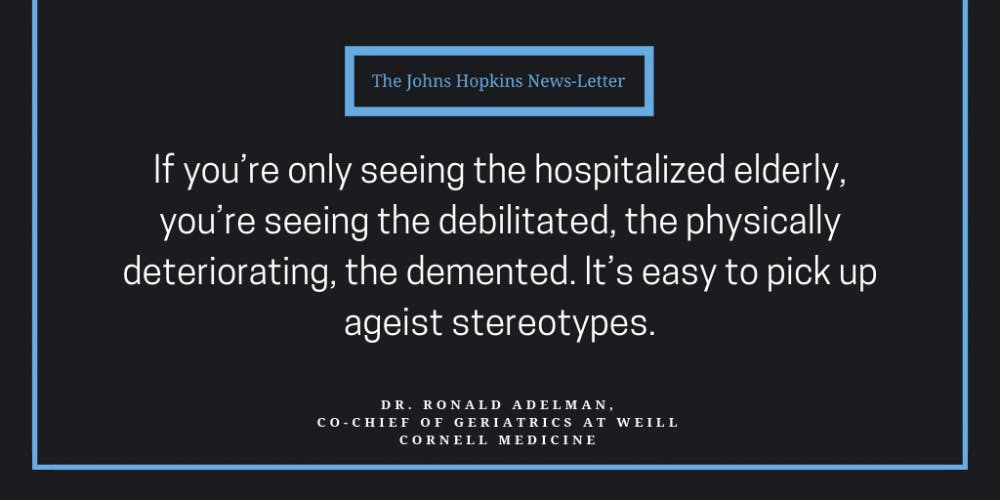While medical school is undoubtedly a place for hard work and studying, many medical schools are beginning to shift their curriculum to include the more personable and empathetic parts of being a doctor.
With stereotypes and misconceptions of elder patients on the rise, many American medical schools are beginning to devote more time and effort to exposing medical students to healthy, active elders, hoping to prevent further misconceptions and biases about older patients in the future.
While most are familiar with the terms racism, sexism and homophobia, the term ageism is lesser-known and in modern society. Coined in 1968, the term simply means discrimination against a person due to their age. While it is prevalent in many settings, such as television, advertising and the workplace, it can be especially detrimental in the medical setting.
On average, people over the age of 65 see a doctor 12 times a year. The elderly make up 27 percent of all doctor’s visits and 35 percent of all hospital stays. However, this doesn’t prevent misconceptions and stereotypes against these people. Researchers and hospital analysts believe that it is very common for ageism to lead to the over and under-treatment of older patients. It is not uncommon for doctors to dismiss serious medical symptoms as “effects of aging.” In addition, other doctors have been known to see pain, depression and anxiety as untreatable in the elderly, placing more attention and focus on younger patients.
Examples of this dismissive behavior include automatically attributing bruises to aging instead of making sure the patient isn’t living in a violent or abusive household. Another example would be dismissing loss of memory and forgetfulness instead of checking for brain tumors or other abnormalities.
In addition, many medical experts have been known to treat the elderly population as homogeneous, making medical diagnoses based on age group and not personal characteristics of the patient’s. In a 2001 survey of adults aged 60-93, 43 percent reported that doctors and nurses have automatically assumed that ailments were the cause of the patient’s symptoms, and nine percent reported that they have been denied treatment due to their old age.
With ageism becoming more and more evident, many medical schools are beginning to take action to prevent these prejudices in the next generation of doctors. At Weill Cornell Medicine, Dr. Ronald Adelman, co-chief of geriatrics, developed an anti-ageism annual program for all second-year medical students called “Introduction to the Geriatric Patient.” In this two-hour-long session, students get to meet and interact with elderly patients with especially active and healthy lifestyles.
In a recent program, students were introduced to 82-year-old working actor and Shakespeare teacher Elizabeth Shepherd. While Shepherd told students she was currently in treatment for macular degeneration, she also told stories of her personal life.
“I emigrated to Lesbianland for a little while in my 50s,” she said.
Shepherd also talked about her current love life, which involves a 90-year-old partner.
“[They are] in Afghanistan at the moment, so my sex life is not as active as I’d like.”
Adelman explains that he created this program upon the realization that many young adults had growing stereotypes and misconceptions about the elderly.
“Unfortunately, most education takes place within the hospital,” Adelman said in an interview with the New York Times. “If you’re only seeing the hospitalized elderly, you’re seeing the debilitated, the physically deteriorating, the demented. It’s easy to pick up ageist stereotypes.”
Other schools have taken this empathetic education even further: The University of North Carolina School of Medicine has a semester-long course on the topic of ageism. Other schools, such as the Medical University of South Carolina and the Icahn School of Medicine at Mount Sinai, match students with elderly patients they can follow throughout their four-year educations, visiting them at home, taking them to doctors appointments and even making the occasional hospital visit.
Many praise these up-and-coming efforts by medical students to diminish ageism in the workplace, including Hopkins sophomore pre-med student Sharon Truong.
“The elderly are in much need of medical care from doctors and physicians, especially with the fact that they spend more on health care as an age group,“ Truong said. “I think these changes are necessary to ensure that the health care the elderly receive is not ‘set to the margins’ and to make [way] for new advances in other modes of research and care.”





